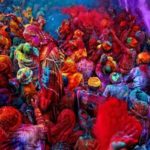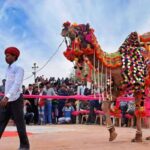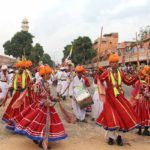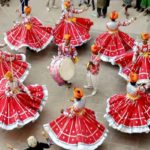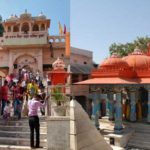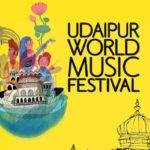10 Most Famous Festivals India is a vibrant country, full of festivals and holidays. If it’s a Hindu anniversary, an Islamic holiday or a regional festival, you’ll find that in India there’s almost always something to celebrate.
Indian festivals have always drawn visitors from all over the world not only because of their vibrant colors and boisterous participants, but also because they are a perfect way to have meaningful encounters with local people and see the country as happy as possible.
In this post, we’ll address India’s top festivals like Diwali, Holi, the Pushkar Camel Festival, and many more. Stick around till the end to get some tips on your first Indian festival experience.
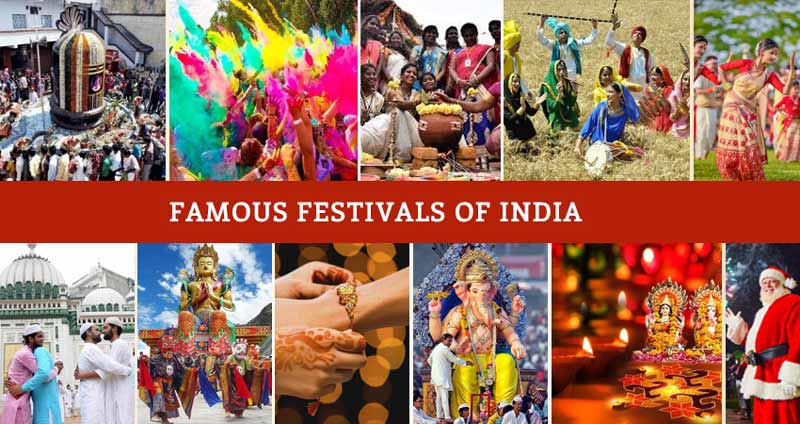
Puri Rath Yatra
The Rath Yatra, or chariot festival, is one of South India’s most famous festival parades. It is held in Puri, where Lord Jagannath, who is a sort of Lord Krishna, sits with his brother Balram and sister Subhadra in a grand chariot, and is carried through the city in the midst of great fanfare, song and dance. Tourists and tourists come from far and large to witness the magnificence. Every year the number of chariot pullers and devotees cross lakhs and the procession is broadcasted live on state, regional and foreign T.V. Networks, networks.
Rath Yatra typically falls in July, but this depends on the calendar of the Vikram Samvat.
Ganesh Chathurthi
Ganesh Chaturthi is a spectacular Hindu Festival which honors the birth of Lord Ganesh for 11 days each year. Lord Ganesh, easily recognized as the elephant-headed deity, is popularly decorated for his ability to bring wealth and is regarded as the ‘Remover of Obstacles.’
The festival is seeing intricate Ganesh statues installed in people’s homes and specially constructed podiums. The figures are then paraded through the streets on the final day, celebrated as Ananta Chaturdasi, with much singing and dancing, before being submerged in nearby lakes and ponds. At Mumbai alone, over 150,000 statues were used in the festivities.
Teej
A colorful festival in India, Teej is a moonsoon celebration particularly for women. The festival is celebrated by married people, mainly in the northern, northeastern, and western parts of the world. Numerous names in different states, such as Hartalika Teej, Kajari Teej, Hariyali Teej and more, are popular for the occasion.
The Teej Monsoon Festival is considered to be a sign of divinity Parvati’s reunion with her husband Lord Shiva, after being separated for 100 years. People are grateful for their marital bliss. They ‘re dressed in traditional bridal wear and other costumes, decorating their hands with henna, singing special Teej festival songs, dancing joyfully swinging on flower-decorated swings attached to massive tree branches.
Rajasthan has grand celebrations, particularly Jaipur. The royal ‘Pink City’ organizes a royal procession of Goddess Parvati’s idols, as it is thought to be the epitome of women’s strength.
Raksha Bandhan
Raksha Bandhan honors the fraternal bond of love. Raksha Bandhan’s name refers to ‘a protective bond.’ Brothers make a vow to their sisters on this day to protect them from any harm and sisters pray to God to protect their brother from all evil. Generally this one day festival occurs in the month of August. Sisters give her brothers a little puja, And tie on their wrist a vibrant and frequently ornamented thread called Rakhi. Brothers on their part have to promise to look after their sisters until their last breath and to sweeten the deal with some sort of gift!
Onam
A cultural and heritage rich festival, Onam is the largest festival in beautiful Kerala state. In Thrissur, Kottayam, Kochi and Trivandrum one will witness the most impressive of all the celebrations.
Onam is a harvest festival lasting for 10 days that represents the legendary King Mahabali’s homecoming. People decorate with flower arrangements at the front of their homes to welcome the King. Certain celebrations include Kathakali dances, a grand festival called Onasadya and races of snake-boats.
Janmashtami
Lord Krishna ‘s birth (a re-incarnation of Lord Vishnu) is celebrated in August-September on the eighth day of a lunar fortnight, hence the name Janmashtami (birth + eightth day). Lord Krishna was said to be a mischievous child who loved milk , butter, and ghee, so women would fast and make all sorts of milk-based sweets and offer it to the Lord. We also visit temples or build chambers of prayer at home and pray to Lord Krishna.
Janmashtami’s one practice is to Dahi Handi. It is done with great passion and zeal. A buttermilk-filled clay pot is held up very high above the ground. A human pyramid of men who practiced for weeks before this event then seeks to hit pot height. The person at the top of the human pyramid tries to break the handi by hitting it with a blunt object. If this happens, it spills coconut water or buttermilk over the whole party, symbolizing their success by unity. Handis are set up throughout the area, and “Govinda Pathaks” groups ride around in trucks trying to break as many handis as possible throughout the day to enjoy the rich bonuses that come with breaking the highest handis successfully!
Hemis Festival
Hemis is a two day Buddhist festival, held primarily in Ladakh’s Hemis Monastery. The festival draws a lot of pilgrims but more visitors who come with the popular Chadar trek for the festival and club it out. Here the celebration involves Cham dance with percussion and background folk drums, trumpets, and cymbals, played by professional monks. The Buddhist who is otherwise celibate and recluse Monks shed their plain clothes, wearing bright robes and masks, and dancing with the locals for a grand display. Therefore, Hemis is celebrated with pomp, commemorating the birthday of Padmasambhava, who was the father of Tibetan Tantric Buddhism.
Holi Festival
Holi is an annual Hindu festival held in March and is the celebration of the triumph of good over evil. Holi is also referred to as the Colors Festival because of the countrywide chaotic colored-power struggle taking place on this day of boisterous celebrations.
The story behind Holi starts with the demon Holika under the command of Lord Vishnu who was defeated by the hero Prahlada. To mark the demon’s defeat, a statue of Holika is symbolically destroyed on the night of the full moon in March, and the demon’s death is celebrated with color wars, music , dancing, singing, and parades the next day.
It is one of India ‘s favorite festivals for travelers who are also attracted to Holi by the contagious joy of the participants and the chance to capture incredible photographs.
Diwali Festival
Identified as the ‘Lights Festival,’ Diwali is one of the biggest Hindu festivals in India. The festival marks the birthday of the Goddess Lakshmi, and the triumph of Lord Rama over Ravana for five days.
People decorate their homes with small clay lamps, known as diyas and candles, lighting the sky with firecrackers and firework displays. Diwali is celebrated with plenty of joy and happiness, so staying in a guesthouse and sharing the festivities with local Indian families is a wonderful moment.
Pushkar Camel Fair
Pushkar Camel Fair is a perfect way to delve into Rajasthan’s breathtaking desert history.
Pushkar is a small town situated in the Thar Desert where thousands of colorfully dressed camels arrive for a big carnival once a year, along with their owners. The Pushkar Fair started as an event buying and selling livestock, But in recent years Rajasthan Tourism has grown to be a beautiful show of Rajasthani culture.
The festival is full of great events including street performances by snake charmers, singers, folk dancers, camel races, and beauty contests. You should also find out the contests on Best Mustache and Turban Tying.
The fair itself is also very crowded and filled with people seeking to enjoy the carnival. Try getting a bird’s eye view of the celebrations from a hot air balloon, if you want to escape the crowds.

